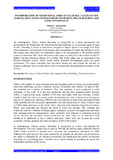| dc.contributor.author | Katola, Michael T | |
| dc.date.accessioned | 2015-06-14T09:40:28Z | |
| dc.date.available | 2015-06-14T09:40:28Z | |
| dc.date.issued | 2014 | |
| dc.identifier.citation | European Journal of Research in Social Sciences Vol. 2 No. 3, 2014 | en_US |
| dc.identifier.uri | http://hdl.handle.net/11295/84763 | |
| dc.description.abstract | In contemporary Africa, formal education is recognized as a basic prerequisite for
development. By implication, the school has become important as a socializing agent. In spite
of this, schooling is based in institutions designed to impart specific knowledge and skills
often unrelated to actual needs of the learners and communities to which they belong. It is for
this reason, that need arises for traditional values to be incorporated in the present formal
system of education. The values discussed in the paper are analyzed in the context of John P.
Miller’s holistic education Theory. It is evident that if the values can be integrated in the
Present education system. Africa would realize economic development, peace and good
governance. The paper concludes that education should not only enable the learners to
acquire certificates but to enable them to live as responsible and dependable members of the
society. | en_US |
| dc.language.iso | en | en_US |
| dc.subject | Education | en_US |
| dc.subject | Cultural Values | en_US |
| dc.subject | Development Peace Building | en_US |
| dc.subject | Good Governance | en_US |
| dc.title | Incorporation of traditional African cultural values in the formal education system for development, peace building and good governance | en_US |
| dc.type | Article | en_US |
| dc.type.material | en_US | en_US |

